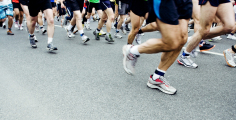 As a triathlete, Dr. Peter Pate knows the exhilaration of competing in endurance sports. As a dentist, he also understands that the lifestyle required of a dedicated athlete poses many risk factors for the development of tooth decay and other oral health issues. Although athletes are generally health-conscious individuals, many people are still unaware of the link between oral health and overall health. Even more individuals do not realize just how vulnerable oral health is to the destructive habits of daily life. Many dentists report that their athletic patients in particular have suffered extensive oral health issues, such as rampant tooth decay and even tooth loss. While some cases can be attributed to little more than poor oral hygiene, many are residual effects of the damage done by the necessities of an athletic lifestyle. Dr. Pate explains how athletic dedication can put you at higher risk for cavity development.
As a triathlete, Dr. Peter Pate knows the exhilaration of competing in endurance sports. As a dentist, he also understands that the lifestyle required of a dedicated athlete poses many risk factors for the development of tooth decay and other oral health issues. Although athletes are generally health-conscious individuals, many people are still unaware of the link between oral health and overall health. Even more individuals do not realize just how vulnerable oral health is to the destructive habits of daily life. Many dentists report that their athletic patients in particular have suffered extensive oral health issues, such as rampant tooth decay and even tooth loss. While some cases can be attributed to little more than poor oral hygiene, many are residual effects of the damage done by the necessities of an athletic lifestyle. Dr. Pate explains how athletic dedication can put you at higher risk for cavity development.
Athletic Diet Equals Greater Risk Factors for Tooth Decay
Endurance athletes place tremendous strain on their bodies. In order for the body to withstand this pressure, it must have enough energy; therefore, the endurance lifestyle requires an increase in caloric intake. On average, an athlete will consume 6-10g of carbohydrates per kg of body weight per day — an estimated 60% of their calories. Unfortunately, the same carbohydrates that fuel the body also fuel the bacterial plaque that coats the inside of the mouth. Malicious oral bacteria, mainly Streptococcus mutans, or S. mutans, have an insatiable appetite for refined sugars and carbohydrates. After greedily metabolizing carbs, bacteria excrete the by-product lactic acid onto the surfaces of the teeth. This acid attacks and weakens the tooth enamel while sapping minerals from your teeth. This makes it very easy for bacteria to slip past this protective layer into the more vulnerable parts of the tooth, causing the formation of dental caries (cavities). Your teeth are the most vulnerable during a race. Some events (like the Ironman triathlon, for instance) can last up to 17 hours. During this time, you must not only consume the necessary daily intake of carbs, but also maintain the energy supply your body will require to keep up with the demand placed on it. Experts suggest an intake of 30-60g of carbohydrates per hour during exercise to maintain blood glucose levels. With this steady intake of fuel, S. mutans and other harmful bacteria can produce an almost continuous supply of lactic acid on your teeth.
Protect Your Teeth Against Increased Caloric Intake
The consumption of necessary carbs to fuel an athlete during a race has been made simple by manufacturers of sports nutrition products such as sports drinks, gels, energy bars, and nutritional supplements. Sports drinks have gained enormous popularity since the introduction of Gatorade by University of Florida athletes decades ago. These products remain a common choice for replenishment during athletic events and competitions. Aside from the sugar content of many of these drinks which feeds the bacteria in your mouth, they are also acidic in nature. While oral bacteria are metabolizing the sugar from a sports drink and releasing acid, the drink itself is already lowering the pH of the entire oral environment – a dangerous combination! Although you’ve heard it countless times before, water still remains the best choice for liquid refreshment, especially during vigorous physical activity. If you must consume these carb-rich products, try using all-natural xylitol-sweetened alternatives afterward. These are available in convenient gums, mints and sprays.
To learn more about sports and your oral health, website or contact Dentistry in Buckhead at (404) 266-9424 to schedule a consultation with Dr. Pate. We proudly welcome patients from the Buckhead area, as well as Sandy Springs, Lenox, Brookhaven, and the greater Atlanta area.
